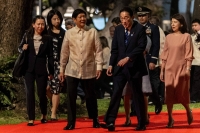Prime Minister Fumio Kishida and Philippines President Ferdinand Marcos Jr. on Friday agreed to start negotiations on a reciprocal troop access deal, in a bid to strengthen military cooperation between two of the United States' closest Asian allies.
Kishida, on an official visit to the Philippines, said he and Marcos had agreed to work together closely with the United States, and, in a veiled reference to China, shared concern about "unacceptable" attempts to "unilaterally change the status quo by force" in the East and South China seas.
"A further decision was made to start negotiations on a reciprocal access agreement and we agreed to further strengthen trilateral cooperation," Kishida told a joint news conference.
Both the Philippines and Japan have taken a strong line against what they see as aggressive behaviour by Chinese vessels amid decades-old disputes over maritime sovereignty.
The troop pact would follow a similar deal the Philippines has with the United States, called the Visiting Forces Agreement, which provides a legal framework under which the U.S. maintains a constant but rotating military presence in the Philippines, largely for training exercises.
"We are cognizant of the benefits of having this arrangement both to our defense and military personnel and to maintaining peace and stability in our region," Marcos said of a pact with Japan.
Marcos also said Japan gave a ¥600 million ($4 million) grant to the Philippines to help boost its defense ministry's efforts in securing coastal radars for maritime security.
Ahead of the visit, the Japanese Defense Ministry announced the delivery of the first air surveillance radar system to the Philippines military as part of a 2020 contract.




















With your current subscription plan you can comment on stories. However, before writing your first comment, please create a display name in the Profile section of your subscriber account page.